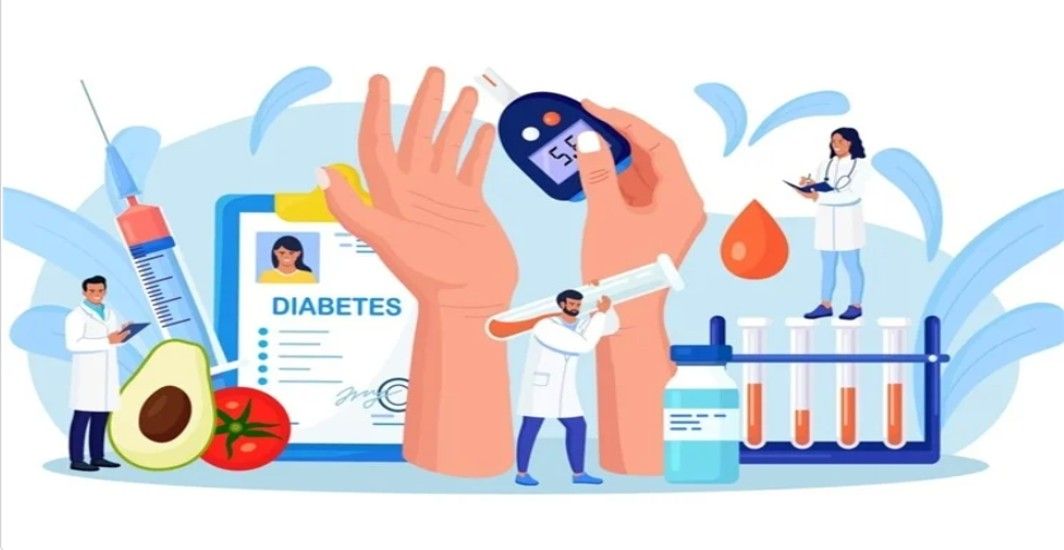Diabetes Management
Does Deficiency Of Any Hormone Cause Diabetes?
2 min read
By Apollo 24|7, Published on - 10 July 2024, Updated on - 11 July 2024
Share this article
0
0 like
.jpg?tr=q-80)
The word diabetes may bring to mind one essential hormone - insulin. But does a deficiency in insulin, or any other hormone for that matter, lead to diabetes? Let's delve deeper into this matter.
Understanding the Role of Insulin in Blood Sugar Regulation
Insulin is a hormone that is produced by the pancreas and it plays a crucial role in controlling blood sugar levels. It allows cells in our body to use glucose (sugar) present in our food for energy. When insulin production is inadequate or ineffective, glucose accumulates in the bloodstream leading to high blood sugar levels or hyperglycaemia- a characteristic feature of diabetes.
Unveiling the Types of Diabetes
Primarily there are two types of diabetes:
- Type 1 diabetes: This results from an autoimmune reaction, where the body's defence mechanism attacks the insulin-producing cells in the pancreas, leading to total insulin deficiency.
- Type 2 diabetes: In this type, cells become resistant to insulin and fail to utilise it effectively. The pancreas may not produce enough insulin to overcome this resistance.
- Gestational Diabetes: Gestational diabetes occurs during pregnancy and usually resolves after delivery. However, it increases the risk of developing Type 2 diabetes later in life.
Insulin deficiency, either absolute or relative, leads to hyperglycaemia and ultimately results in diabetes. No other hormonal imbalance has been directly associated with causing diabetes.
Managing Diabetes Effectively
Understanding the cause of diabetes is vital in addressing this health condition. However, it's equally critical to actively manage it once diagnosed. Lifestyle adjustments such as a healthier diet and greater physical activity can significantly impact your journey with diabetes.
The Apollo Super 6 programme is an initiative that offers personalised support and promotes lifestyle changes that help manage Type 2 diabetes effectively. With features ranging from personalised plans and dedicated coaches to free lifelong access to diabetes management tools and expert consultations, the programme aims to reduce blood sugar levels, waist circumference, and weight while enhancing sleep quality and promoting an active lifestyle.
Diabetes Management
Consult Top Diabetologists
View AllLeave Comment
Recommended for you

Diabetes Management
Can Diabetes Cause Hormonal Imbalance?
Diabetes disrupts hormone balance, affecting blood sugar regulation and stress, sex, and thyroid hormones. Consistent monitoring, medication, balanced diet, exercise, and stress management are vital to managing these imbalances. Understanding this link is crucial for improving overall well-being and diabetes control.

Diabetes Management
Managing Diabetes With Other Responsibilities
The challenge of managing diabetes while juggling daily responsibilities may seem daunting, but it's entirely achievable with the right approach. Adopting collaborative self-management strategies, seeking professional help in case of burnout, embracing team-based care, making healthier lifestyle choices, and proactively preventing complications can help maintain a balanced life.

Diabetes Management
The Best Diabetic Diets: Your Guide to Managing the Condition Effectively
Managing type 2 diabetes well involves adopting a balanced and nutritious diet. Incorporate a variety of fruits, vegetables, whole grains, legumes, lean proteins, and healthy fats into your meals. Monitor your carbohydrate intake and seek professional guidance for a personalised meal plan. Don't forget to consider joining the Apollo Super 6 programme for comprehensive support in managing your condition.
Subscribe
Sign up for our free Health Library Daily Newsletter
Get doctor-approved health tips, news, and more.
Visual Stories

8 Fruits That are Incredibly Healthy for Diabetes
Tap to continue exploring
Recommended for you

Diabetes Management
Can Diabetes Cause Hormonal Imbalance?
Diabetes disrupts hormone balance, affecting blood sugar regulation and stress, sex, and thyroid hormones. Consistent monitoring, medication, balanced diet, exercise, and stress management are vital to managing these imbalances. Understanding this link is crucial for improving overall well-being and diabetes control.

Diabetes Management
Managing Diabetes With Other Responsibilities
The challenge of managing diabetes while juggling daily responsibilities may seem daunting, but it's entirely achievable with the right approach. Adopting collaborative self-management strategies, seeking professional help in case of burnout, embracing team-based care, making healthier lifestyle choices, and proactively preventing complications can help maintain a balanced life.

Diabetes Management
The Best Diabetic Diets: Your Guide to Managing the Condition Effectively
Managing type 2 diabetes well involves adopting a balanced and nutritious diet. Incorporate a variety of fruits, vegetables, whole grains, legumes, lean proteins, and healthy fats into your meals. Monitor your carbohydrate intake and seek professional guidance for a personalised meal plan. Don't forget to consider joining the Apollo Super 6 programme for comprehensive support in managing your condition.

